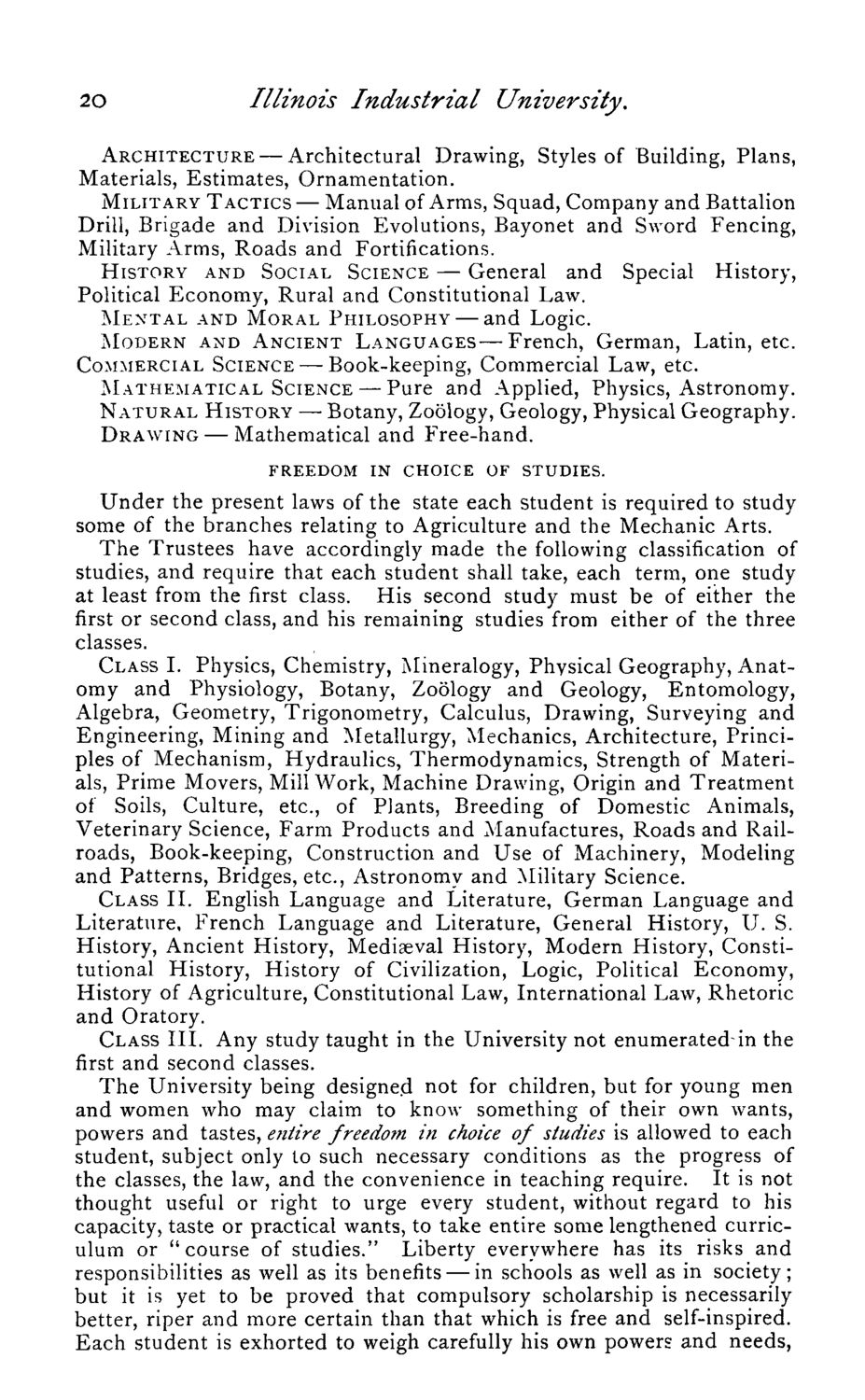| |
| |
Caption: Course Catalog - 1873-1874
This is a reduced-resolution page image for fast online browsing.

EXTRACTED TEXT FROM PAGE:
20 Illinois Industrial University. ARCHITECTURE — Architectural Drawing, Styles of Building, Plans, Materials, Estimates, Ornamentation. MILITARY TACTICS — Manual of Arms, Squad, Company and Battalion Drill, Brigade and Division Evolutions, Bayonet and Sword Fencing, Military Arms, Roads and Fortifications. HISTORY AND SOCIAL SCIENCE — General and Special History, Political Economy, Rural and Constitutional Law. MENTAL AND MORAL PHILOSOPHY — and Logic. MODERN AND ANCIENT LANGUAGES—French, German, Latin, etc. COMMERCIAL SCIENCE — Book-keeping, Commercial Law, etc. MATHEMATICAL SCIENCE — Pure and Applied, Physics, Astronomy. NATURAL HISTORY — Botany, Zoology, Geology, Physical Geography. • DRAWING — Mathematical and Free-hand. FREEDOM IN CHOICE OF STUDIES. Under the present laws of the state each student is required to study some of the branches relating to Agriculture and the Mechanic Arts. The Trustees have accordingly made the following classification of studies, and require that each student shall take, each term, one study at least from the first class. His second study must be of either the first or second class, and his remaining studies from either of the three classes. CLASS I. Physics, Chemistry, Mineralogy, Physical Geography, Anatomy and Physiology, Botany, Zoology and Geology, Entomology, Algebra, Geometry, Trigonometry, Calculus, Drawing, Surveying and Engineering, Mining and Metallurgy, Mechanics, Architecture, Principles of Mechanism, Hydraulics, Thermodynamics, Strength of Materials, Prime Movers, Mill Work, Machine Drawing, Origin and Treatment of Soils, Culture, etc., of Plants, Breeding of Domestic Animals, Veterinary Science, Farm Products and Manufactures, Roads and Railroads, Book-keeping, Construction and Use of Machinery, Modeling and Patterns, Bridges, etc., Astronomy and Military Science. CLASS II. English Language and Literature, German Language and Literature, French Language and Literature, General History, U. S. History, Ancient History, Mediaeval History, Modern History, Constitutional History, History of Civilization, Logic, Political Economy, History of Agriculture, Constitutional Law, International Law, Rhetoric and Oratory. CLASS III. Any study taught in the University not enumerated-in the first and second classes. The University being designed not for children, but for young men and women who may claim to know something of their own wants, powers and tastes, entire freedom in choice of studies is allowed to each student, subject only to such necessary conditions as the progress of the classes, the law, and the convenience in teaching require. It is not thought useful or right to urge every student, without regard to his capacity, taste or practical wants, to take entire some lengthened curriculum or "course of studies." Liberty everywhere has its risks and responsibilities as well as its benefits — in schools as well as in society; but it is yet to be proved that compulsory scholarship is necessarily better, riper and more certain than that which is free and self-inspired. Each student is exhorted to weigh carefully his own powers and needs,
| |